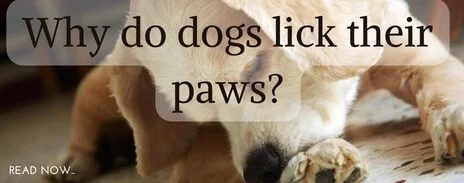Do you need to find the answer to why does a dog lick its paws? It is very frustrating to watch your dog incessantly and obsessively licking its paws, especially once they lose interest in everything around them. So what does it mean for a dog to lick or chew its paws constantly? While it’s normal for dogs to groom their paws now and then, an excessive amount of licking usually indicates an underlying problem. There are specific reasons for this behavior, and it’s up to you because the owner must work out what the matter is also.
If the behavior appears suddenly, continues for an extended period of your time, or is amid bleeding, swelling, limping, or odor, the most effective thing to try to do is to determine a veterinarian immediately and have them do the investigative work with the proper diagnostic tools. You don’t want your dog’s paw-licking to get out of hand. Sometimes a habit can become an addiction that is difficult to break. Dogs who lick their paws excessively often develop swelling and stains on the fur of their feet (if they’re light-colored). Excessive licking may cause moisture to become trapped between the dog’s toes, creating a perfect setting for an infection.
Once inflammation or an infection sets in, a regeneration can form. Inflammation and infection can cause discomfort and itching, and this could cause your dog to lick their paws even more. Constant licking can further contaminate the realm with bacteria and impair the healing process indefinitely. This article discusses ten common causes of paw-licking and descriptions several strategies to prevent the behavior and forestall it in the future. Once you and your vet have identified the difficulty, you’ll be able to address the underlying cause and stop your dog from constantly licking its paws.
The possible reasons for Why does a dog lick its paws?
- Pain
- Allergy or Yeast Infection
- Gastrointestinal Issues
- Boredom
- Anxiety
- Displacement Behavior
- Hormonal Imbalance
- Dry Skin
- Fleas and Ticks
- Deicing Salts and weather conditions
If your dog suddenly starts licking a particular paw excessively, a recent injury is also the culprit.
1. Pain
If your dog starts licking their paws suddenly, it will indicate pain or irritation, especially if they’re licking just one paw. If the licking is proscribed to at least one paw, the source of the difficulty is probably going right there on the paw. The pain in this area is often caused by almost anything, but common culprits include insect bites, thorns, minor wounds, small pieces of embedded glass, broken nails, etc.
If you do not see anything, don’t ignore it. Take your pet to the vet very soon. Sometimes, something could also occur at a deeper level, like a muscle sprain or some form of inflammation or fracture, especially if the licking is in the middle of limping. Like humans, dogs will be allergic to all or any type of things in their environment. A biopsy from a vet can help narrow it down.
2. Allergy or Yeast Infection
Chronic licking is typically attributed to allergies, which can come from almost anything. It may well be their food, the chemicals in your yard, carpet-cleaning products, weeds, grass, medicine, or something else. For example, if your dog licks their paws after walking, the itching might be caused by pesticides within the grass or a selected weed. Clean your dog’s feet with a wet wipe to stop further irritation after each walk. Finding the critical reason for the itchiness is a frustrating ordeal.
It should take some enormous investigative work to determine what your dog is allergic to, and it’s best to have your vet run a biopsy so you’ll address the basis for the matter instead of just giving your dog antihistamines. If you think a yeast infection, a poor diet is also accountable. Sometimes, the only treatment for hair loss and itching caused by a yeast infection is changing your dog’s food and supporting your vet’s advice. Confirm to supply quality foods with specific nutrients and vitamins that are beneficial for the gut and skin.
3. GI issues could also strike gastrointestinal Issues in Dogs who lick their paws excessively
Per a clinical study published by the Journal of Veterinary Behavior, gastrointestinal issues were present in an exceedingly significant number of dogs who displayed abnormal licking. Nine dogs that were showing signs of too much licking were compared with ten healthy dogs. On top of taking medical and behavioral histories and conducting intensive physical and neurological examinations, the dogs underwent abdominal ultrasounds, endoscopic tests, and biopsies of the stomach and duodenum. The research revealed that 14 of the 19 licking dogs were found to own some GI abnormality, like lymphocytic-plasmacytic infiltration, chronic pancreatitis, or a gastric foreign body.
4. Boredom
Today it creates a monotonous environment for dogs. Dogs that were once used to walking, hunting, and grooming are now often left in the small yards of their homes, or worse, for hours a day. Energetic dogs can become frustrated and engage in destructive activities such as excessive licking and biting of their paws.
How to prevent boredom in dogs?
- Do not leave your dog at home for long periods.
- If you must leave your dog alone, give him a pack of food to keep him occupied. • Give your dog frequent opportunities to play and exercise.
- Walk your dog or play fetch in the garden for at least 30 minutes daily.
- Allow your puppy to socialize with others and other dogs (if he is well-mixed).
- Never leave your dog in a crate or leash in the yard.
5. Fear
Anxious dogs often seek relief from excessive licking. Possible causes of anxiety range from individual problems to obsessive-compulsive disorder. In this sense, licking or chewing on paws in dogs can resemble chewing human nails.
More or less, dogs lick their paws beforehand bed or lick themselves to nap. It’s her way of relaxing and calming down. If there is no redness or swelling, this paw-licking should not be a problem.
Possible causes of anxiety in dogs
- Boring
- Lack of physical exercise
- Depression
- Separation from the owner for a long time
- Diseases
If licking becomes forced and excessive, dogs may lick raw and cause unpleasant sores, often called “licking granulomas.” It is not yet known whether granuloma licking is caused by anxiety or is a cause for concern. “Chicken or egg” scenario.
6. Motor behavior
Sometimes licking a dog’s claws can eliminate the behavior. Displacement behavior occurs when the dog is in conflict and exhibits behavior that appears relatively unrelated to the current situation. Humans may feel a little stressed and lick a pen or rotate a ring when they don’t know how to proceed. Dogs may lick for similar reasons.
Recently, the dog I had for riding and training was biting his right leg. Interestingly, biting a foot often happens when something frustrates you. For example, when his toy fell to the ground, it went fine It also occurs when you couldn’t get what you wanted. His paw chewing was greatly improved through exercise and impulse control practices, and the visible spots on his paw disappeared.
7. Hormonal Imbalance
When a dog has a hormonal imbalance, they either produce too much cortisol (which can cause Cushing’s disease) or don’t produce enough thyroid hormone (which can cause hypothyroidism). This can increase a dog’s vulnerability to skin issues such as balding, brittle hair, and red spots; licking these painful red spots or bald spots can lead to a secondary infection.
8. Dry skin
Dry skin is often a race-specific problem but can also occur in excessive bathing or cold, dry environments.
Particular breeds: Hairless breeds are prone to various skin diseases because they lack natural hair protection. This category’s species include Chinese Crested, Zoolowitz Quintley, and American Hairless Terrier.
- Dry Weather: Dry skin also occurs in dogs that live in cold, dry climates. If this is the case, ask your veterinarian to recommend a natural dog lotion or oil to help relieve the dryness. If you’re worried about the oil messing up your home, you can feed your dog a quality vitamin and oil supplement to treat dry skin.
- Bathing Habits: Regardless of climate or breed, if your dog’s skin is dry, bathe excessively and avoid harsh soaps.
9. Fleas or ticks
Fleas and ticks cause severe itching, leading to forced licking and chewing of the paws. If your dog is allergic to fleas, the situation will get worse. In addition to using insecticides and flea medications, get rid of fleas in your home. If your pet is allergic to cleaning products or over-the-counter medications, there are nontoxic ways to get rid of fleas and keep them from returning.
10. AntifreezeAntifreeze and cold weather salt
If your dog only licks his paws in the winter, it could be due to plantar pain caused by antifreeze salt or ice cubes.
- Deicing salt: Salt used to defrost driveways and streets can cause chemical burns on your dog’s feet. Avoid areas that are sprayed with dissolving agents, or have your pet wear boots when outdoors in the winter. The dog’s paws should also be washed after walking, and a bowl of warm water and a towel should be placed near the door to avoid ingesting toxic salts.
- Snowballs: Snow trapped in your dog’s fur may cause snowballs to form between your woolly toes. This can lead to cracking, bleeding, and very painful hair-pulling. Keep hair cut between bandages and toes during the winter. If you have a hairy dog, there are ways to prevent snowballs from forming, including rubbing the Crisco between the pads and into the fur.
VLogs related to the answer; Why does a dog lick its paws? – https://www.youtube.com/results?search_query=Why+do+dogs+lick+their+paws%3F
Related Post – https://dogs1000.com/dogs-that-look-like-german-shepherds/

I’m Revathi Bodduri from India. I’m a blogger and a young entrepreneur who is really a dog lover. I am eager to educate dog owners by sharing dog-related knowledge worldwide. You can contact me at any time through contactdogs1000@gmail.com.

